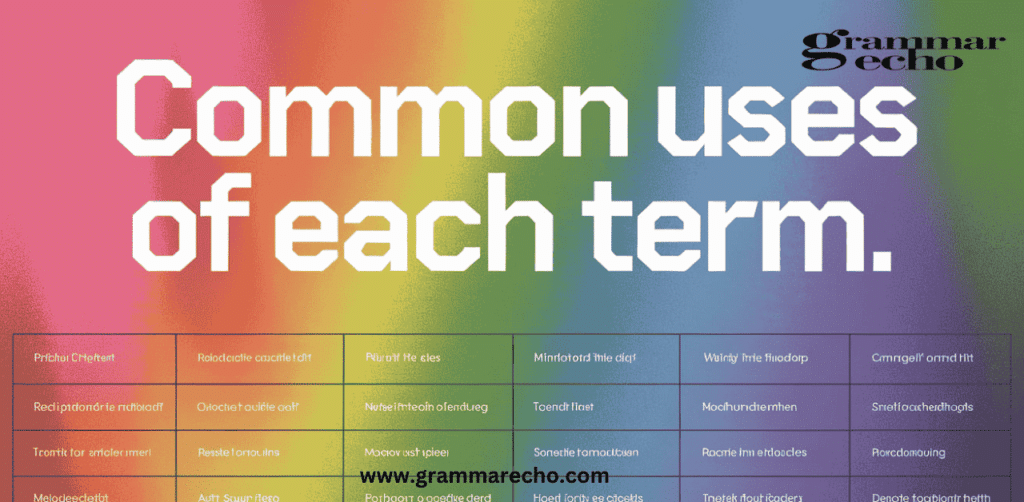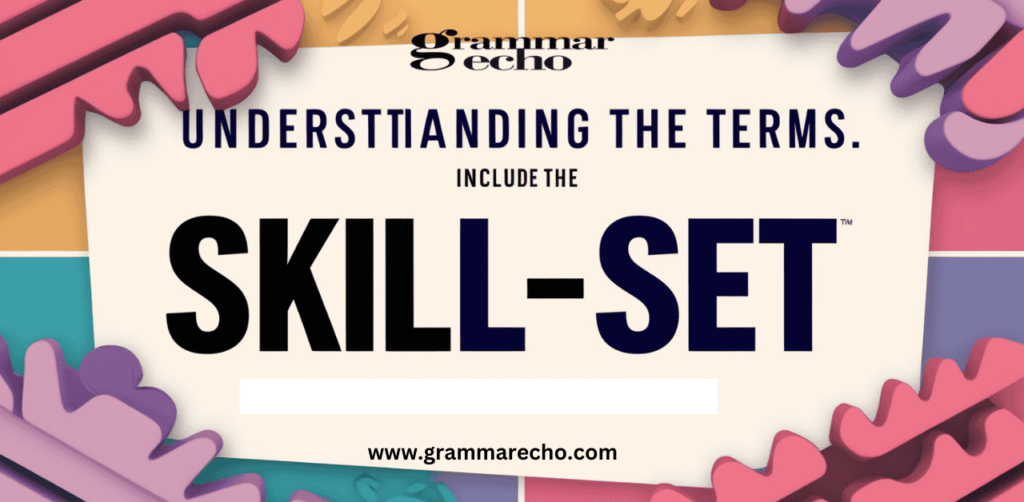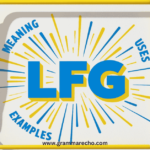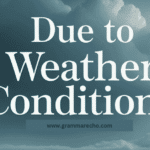A skill set is a group of a person’s abilities and knowledge. The correct way to write it is as two words: “skill set.” While some people write it as a “skillset” or “skill-set,” these forms are less preferred in formal writing like resumes and business documents.
Ever wondered why employers always ask about your skill set in job interviews? Having the right mix of abilities can make you stand out from other job seekers. Your skill set shows what you can do and helps employers know if you’re right for the job.
The term “skill set” appears often in job listings and career guides. Most professional writers and editors prefer using “skill set” instead of “skillset” or “skill-set.” Using “skill set” correctly in your resume and cover letter shows attention to detail and professionalism.
The Common Confusion: “skillset or skill set”
When it comes to professional writing, understanding the difference between “skill-set,” “skillset,” and “skill set” is essential. These variations might look similar, but their usage and correctness vary depending on the context.

Many writers and editors widely accept ‘skill set’ as grammatically correct. It refers to a collection of abilities and competencies that someone possesses, typically in a professional or technical domain. For instance, a person’s skill set might include project management, data analysis, coding, and problem-solving. Writers and employers frequently use this term in résumés, cover letters, and job applications because it follows formal writing standards.
Writers use “skillset” more casually, and readers typically see this variation in informal writing or conversational language. While Google Dictionary may recognize it, major linguistic references like Dictionary.com and the Cambridge Dictionary do not list “skillset” as a preferred spelling. Most spell checkers flag it as incorrect.
Lastly, “skill-set” with a hyphen is almost obsolete. Modern writers rarely use this form, though editors once included it in their style guides. Publications adhering to AP Style or other formal guidelines typically discourage hyphenated variations unless absolutely necessary for clarity.
Sticking to a “skill set” ensures linguistic accuracy and grammatical precision in professional communication. It’s the version employers, recruiters, and editors expect in official documents like résumés, job listings, and business correspondence. For casual or informal writing, “skillset” might pass unnoticed, but it’s best to avoid using it when aiming for clarity and professionalism.
You will like: “Up to Date” or “Up-to-Date”: Which One Should You Use?
Understanding the Terms
When discussing skills and abilities in professional or personal contexts, terms like “skill-set,” “skillset,” and “skill set” often come into play. While these terms may seem interchangeable, their definitions and uses vary, especially when considering grammar, style, and context. Let’s break down each one.
Definition of “Skill-Set”
Writers historically used “skill-set” with a hyphen to describe a collection of skills or abilities in a specific area. Though common in the past, this form has largely fallen out of favor in modern writing. Publications and style guides like AP Style now recommend avoiding unnecessary hyphenation. For example:

- He developed a strong skill-set during his career in engineering.
Professional writers rarely use this hyphenated form in modern documents, though readers can still understand its meaning.
Definition of “Skillset”
“People use ‘skillset,’ written as one word, as an informal variation of ‘skill set.'” It represents the same concept—a unique combination of a person’s abilities or competencies. Though people sometimes use it in casual language, most dictionaries, including Dictionary.com and the Cambridge Dictionary, don’t consider it grammatically correct. For instance:
- Her skillset includes effective communication and teamwork.
Although you might encounter this spelling in informal writing or online discussions, it’s best to avoid it in formal documents like résumés or cover letters.
Definition of “Skill Set”
“Skill set,” written as two separate words, is the grammatically correct and widely accepted form. This noun phrase refers to a collection of abilities or proficiencies a person has in a specific area. For example:
- His skill set in coding and problem-solving made him a top candidate for the job.
This version follows formal writing standards and is preferred in business documents, job applications, and professional communication.
Common Uses of Each Term
- “Skill-Set”
- Rarely used in modern writing.
- People sometimes see it in older documents or informal contexts.
- “Skillset”
- Common in informal or casual language.
- It occasionally appears online but gets flagged by spell checkers in professional writing.
- “Skill Set”
- The standard choice for formal writing, including résumés, job listings, and official correspondence.
- Recognized as the correct spelling by major dictionaries and style guides.
By understanding these distinctions, you can ensure your writing is accurate and professional. Whether you’re crafting a job application or discussing your abilities, using the correct term—“skill set”—will leave a polished impression.
Read more about: “Re-sign or Resign? Learn When and How to Use Each Correctly
Grammar and Linguistics
Understanding the grammar and linguistic nuances of terms like “skill-set,” “skillset,” and “skill set” is crucial for accurate and professional communication. Let’s dive into the role of punctuation, the concept of compound words, and the distinctions between these variations.
Analysis of the Hyphen’s Role in “Skill-Set”
Traditionally, the hyphen in ‘skill-set’ joined the words ‘skill’ and ‘set,’ creating a clearer connection between them. Hyphenation often helps to avoid ambiguity in some phrases. However, the hyphen doesn’t add clarity in this case since the term is already straightforward.
Modern style guides like AP Style and The Chicago Manual of Style discourage unnecessary hyphenation. For instance:
- He showcased his extensive skill-set during the interview.
While grammatically acceptable, this form has fallen out of favor as simpler, hyphen-free alternatives dominate current usage.
Explanation of Compound Words and Their Formation
Compound words combine two or more words to form a single idea. These can be:
- Open Compounds: Words written with a space, like “skill set.”
- Hyphenated Compounds: Words connected by a hyphen, like “skill-set.”
- Closed Compounds: Words merged into one, like “skillset.”
The form chosen often depends on usage trends, context, and style guidelines. For example, “skill set” remains an open compound because it clearly conveys the idea without additional punctuation. Conversely, “skillset” (closed compound) is more informal and has yet to gain widespread acceptance.
Differences Between “Skillset” and “Skill Set”
- Grammatical Accuracy:
- Skill set is a noun phrase recognized by major dictionaries and grammar authorities.
- Skillset is an informal alternative, often flagged by spell checkers as incorrect in professional writing.
- Context and Usage:
- Use skill set in formal contexts like résumés, cover letters, and business documents.
- Skillset may appear in casual conversations or as a stylistic choice in creative writing but lacks credibility in formal scenarios.
- Spelling Trends:
- Skill set aligns with linguistic accuracy and remains the preferred choice in American English.
- Skillset reflects the evolution of language in informal settings but isn’t widely endorsed by grammar guides.
By understanding these distinctions, you can choose the appropriate term based on the context and maintain grammatical precision in your writing. Whether you’re drafting a job application or discussing a collection of abilities, sticking to the accepted “skill set” standard ensures professionalism and clarity.
Usage in Different Contexts
You’ll find the terms ‘skill-set,’ ‘skillset,’ and ‘skill set’ in different contexts, each with its own conventions. Understanding how these terms are used in professional, academic, and casual settings helps you communicate effectively in any scenario.
Professional and Industry-Specific Usage
In professional settings, precision and clarity are key. The term “skill set” is the preferred choice in résumés, cover letters, job descriptions, and corporate communications. This spelling aligns with formal writing standards and is widely accepted in business and industry-specific documents.
For example:
- Her skill set in project management and data analysis made her an ideal candidate for the role.
- We are seeking candidates with a diverse skill set in software development and effective communication.
Using “skillset” in professional documents might give the impression of carelessness since many spellcheckers flag it as incorrect. If you aim to maintain credibility, stick with “skill set.”
Academic and Educational Contexts
In academic writing, accuracy and adherence to grammatical conventions are emphasized. “Skill set” is appropriate in research papers, textbooks, and educational content. It fits the formal tone expected in such settings.
- Developing a strong skill set in critical thinking and problem-solving is vital for academic success.
- The curriculum focuses on building skill sets that prepare students for real-world challenges.
Hyphenated forms like “skill-set” or the informal “skillset” are rarely used in academia, as they don’t conform to the standardized language norms followed in this context.
Everyday Conversation and Informal Writing
In casual conversations or informal writing, such as blog posts, text messages, or social media updates, “skillset” is often used interchangeably with “skill set.” Its one-word form can feel less formal and more approachable.
For example:
- I’ve been working on my coding skillset lately—it’s been a fun challenge!
- Your skillset as a musician is seriously impressive.
While this usage is common, it’s important to recognize the audience. In informal settings, “skillset” may not draw criticism, but it’s best avoided in formal communications to maintain professionalism.
Alternative Words
While “skill set,” “skillset,” and “skill-set” are commonly used to describe a person’s abilities, there are many other words and phrases that can convey similar meanings. Whether you’re looking to vary your language or find a more precise term, here are some alternative words you can use to describe a collection of skills or abilities.
1. Abilities and Competencies
The terms “abilities” and “competencies” are direct alternatives to “skill set.” Both words focus on the particular capabilities that someone possesses, whether for a job or a specific task.
- Her negotiation and conflict-resolution abilities make her a valuable team member.
- The training program enhances your technical writing and data analysis competencies.
2. Expertise
When referring to a person’s high level of proficiency or specialization in a particular area, “expertise” is an excellent alternative. It implies not just a collection of skills but an advanced understanding or mastery.
- His expertise in artificial intelligence sets him apart in the tech industry.
- The workshop will help you develop your expertise in digital marketing strategies.
Expertise can be a great way to elevate your writing, especially when you want to highlight someone’s advanced skills.
3. Proficiencies
“Proficiencies” emphasizes the degree of competence a person has in certain skills. It’s a term often used to describe specific areas of mastery.
- She possesses proficiencies in both graphic design and user experience research.
- His proficiencies in project management are a major asset to the company.
This word is slightly more formal and is often used in professional and academic contexts.
4. Capabilities
Similar to “abilities,” “capabilities” refers to the potential someone has to perform tasks or solve problems. It can describe both personal and professional contexts.
- Her leadership capabilities were demonstrated through successful project completions.
- The new software significantly increased the capabilities of our team to analyze data.
This word emphasizes the present and future potential of someone’s skill set.
5. Toolbox Filled with Different Skills
For a more metaphorical alternative, consider a “toolbox filled with different skills.” This phrase paints a vivid image of someone with various skills, ready to be applied to different situations.
- His toolbox has different skills, including coding, design, and marketing.
- She brought her toolbox of skills to the project, making the team stronger and more adaptable.
Read more about: Pre Existing or Preexisting: Which One is Correct?
Practice exercise
Ready to test your understanding of skill-related terms? This quiz will help you practice how to use “skill set,” “skillset,” and “skill-set” in different contexts. Challenge yourself to see how well you can conjugate these terms and choose the right one based on the sentence.
Question 1: Which is correct?
The candidate’s __________ is perfect for this position.
- a) skill set
- b) skillset
- c) skill-set
Answer: a) skill set
Explanation: “Skill set” is the preferred and grammatically correct form, especially in professional and academic writing.
Question 2: Choose the appropriate option.
Her __________ in project management impressed the hiring committee.
- a) skill-set
- b) skill set
- c) skillset
Answer: b) skill set
Explanation: “Skill set” is used here to indicate a range of abilities or expertise in project management.
Question 3: Fill in the blank.
A __________ is an essential tool for anyone applying for a job in tech.
- a) skill set
- b) skillset
- c) skill-set
Answer: a) skill set
Explanation: “Skill set” is the correct choice in this context, emphasizing a collection of skills.
Question 4: Which one fits?
His __________ includes a strong knowledge of coding and problem-solving.
- a) skill set
- b) skillset
- c) skill-set
Answer: a) skill set
Explanation: “Skill set” should be used to describe a combination of abilities or proficiencies.
Question 5: Correct the sentence.
The team was impressed with her ability to manage a diverse skill-set.
- a) skill-set
- b) skillset
- c) skill set
Answer: c) skill set
Explanation: “Skill set” is the grammatically correct version, and the hyphen in “skill-set” is unnecessary.
Bonus Question:
Which of these terms is considered a proper noun when referring to a specific company?
- a) skill set
- b) skillset
- c) skill-set
Answer: b) skillset
Explanation: When referring to the company “Skillset,” it’s capitalized and written as a single word.
Final Thoughts on Skill-Set Usage
Choosing between “skill set,” “skill-set,” or “skillset” can be confusing. However, the two-word version, “skill set,” is more widely accepted and preferred in professional writing. It clearly conveys a person’s abilities and strengths.
While “skillset” is used informally, it’s best to stick with “skill set” in formal documents like resumes and job applications. Being precise with language can help you communicate your qualifications more effectively and professionally.
FAQ’s
“Skillset” is commonly used as a single word informally, but the correct and widely accepted version in formal writing is “skill set,” written as two words.
According to Merriam-Webster, “skill set” refers to a set of skills or abilities that a person has. The dictionary lists “skill set” as the preferred spelling, with “skillset” being a less common variation.
You can use “skill set” like this: “Her skill set includes project management, data analysis, and graphic design.” It emphasizes the collection of abilities a person possesses.

Lily Suzi is an experienced blogger and the voice behind Grammar Echo. With a passion for language and a knack for storytelling, she explores the nuances of grammar and writing in a relatable way. Her insights not only educate but also inspire readers to appreciate the beauty of clear communication.








